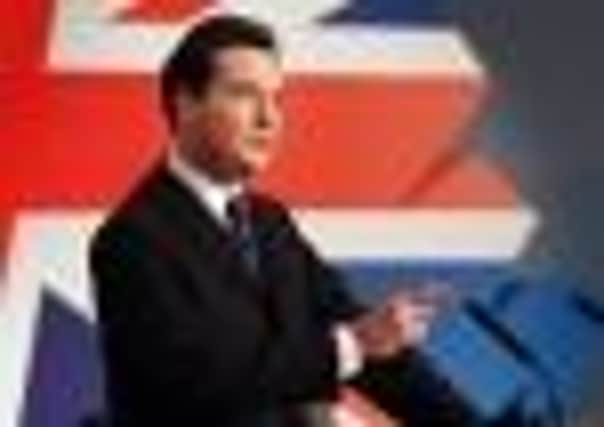GDP figures show UK set for triple-dip recession


The fourth quarter decline in gross domestic product (GDP) marks a sharp reversal of the 0.9 per cent rebound seen in the previous three months, while the economy flatlined in 2012 as a whole and is now not expected to regain its peak level for another two years.
A flat services sector contributed to the disappointing growth, as did disruption to the Buzzard oil field in the North Sea, which was shut during extended maintenance, but has since restarted production.
Advertisement
Hide AdAdvertisement
Hide AdIt was estimated that the shut oil field accounted for more than half of the contraction – around 0.2 per cent.
The oil field’s travails led to the biggest decline in mining and quarrying output since official records began, down 10.2 per cent, and left activity in the wider production sector 1.8 per cent lower quarter-on-quarter, according to the Office for National Statistics (ONS).
Labour accused Chancellor George Osborne of being “asleep at the wheel” amid increasing criticism over his austerity programme and as Britain faces the threat of losing its coveted AAA rating after all three major ratings agencies put the country on negative outlook.
But Mr Osborne insisted he would not “run away” from the problems facing the UK economy. The Chancellor said: “We have a reminder today that Britain faces a very difficult economic situation. A reminder that last year was particularly difficult, that we face problems at home because of the debts built up over many years and problems abroad with the eurozone, where we export most of our products, in recession.
“Now, we can either run away from those problems or we can confront them and I am determined to confront them so that we can go on creating jobs for the people of this country.”
Experts fear the fourth quarter decline has put the UK on course for the first triple-dip since official records began.
GDP – a broad measure for the total economy – would have to contract again this quarter for the UK to be back in recession – the official definition of recession being two successive quarters of negative growth.
Hopes of avoiding that scenario are looking bleak with the snow experienced in the first month of 2013 bound to have an impact on the economy.
Advertisement
Hide AdAdvertisement
Hide AdWith the wintry weather estimated to have cost the economy more than £500 million a day, there is little hope for the current quarter as consumer and business confidence also remains low.
While the figures from the ONS are preliminary estimates and subject to revision, they have dealt a blow to recovery hopes after the UK bounced back from the longest double-dip recession since the 1950s in the third quarter.
Shadow chancellor Ed Balls said now was the time for a “plan B” to support growth through VAT cuts and spending on infrastructure. He added: “The longer David Cameron and George Osborne cling on to their failing plan the more long-term damage will be done. They must finally listen and act to kick-start this economy.”
Danny Alexander, Lib Dem Chief Secretary to the Treasury, said the figures were “not wholly surprising”, but insisted there would be no plan B.
He added: “There’s a great deal that can be done and we are doing everything that can be done, but I think the idea that somehow stepping back from the plans to deal with the fundamental problems in our public finances would help we don’t agree with because one of the things that is really helping the British economy at the moment is the low interest rates we continue to have.”
Mr Alexander insisted credit ratings agencies, which decide the UK’s international credit status, were “not the be-all and end-all”. He said: “What is important is having the right mix of policies for the country that ensures our economic and financial credibility as far as the rebalancing and job creation we need to see.”
The fourth quarter drop is worse than expected, with most economists having forecasted a decline of 0.1 per cent. But experts said the economy was suffering “payback” from the rebound in the third quarter, which was fuelled by the Olympics and clawed back activity that was lost during the Queen’s Diamond Jubilee holiday.
The services sector, which accounts for 77 per cent of the economy, saw activity grind to a halt in the fourth quarter due to the absence of the Olympics boost. The only bright spot was the construction sector, which delivered a 0.3 per cent rise in output, but this was also lower than hoped. The ONS said the UK had recovered only half of the fall in GDP seen since the start of the 2008 recession, with output still 3.3 per cent lower than its pre-recession level, and some experts fear the economy will not fully recover until 2015.
Advertisement
Hide AdAdvertisement
Hide AdThe poor performance from the North Sea oil sector led to Alex Salmond’s opponents arguing that it harmed the economic argument for Scottish independence.
The Scottish Tory chief whip John Lamont said: “Oil is a tremendous resource, but it fluctuates and no-one can ever be quite sure what is round the corner for it. We have seen today the impact a problem can have on an economy the size of the UK’s. Were a separate Scotland – so reliant on oil – to suffer a same misfortune, the impact would be significantly greater.”